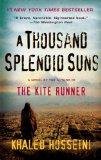Summary | Excerpt | Reading Guide | Reviews | Beyond the Book | Read-Alikes | Genres & Themes | Author Bio

This article relates to A Thousand Splendid Suns
Afghanistan lies on the historically important trading routes between the Middle East and the Indian sub-continent. As a result of numerous invasions and migrations it is made up of many different ethnic groups including Baluch, Chahar Aimak, Turkmen, Hazara, Pashtun, Tajik, Uzbek, Nuristani, Arab, Kirghiz, Pashai and Persian.
Historically, the Pashtun nationality has been the most dominant representing about 50% of the total population. Islam was brought to Afghanistan in the eighth century by Arabs, and the vast majority of the country today are Muslims. After Arab rule there was a period of relative independence when semi-independent states began to form, but these were crushed by the Mongol invasions of the 13th century. Following the collapse of Mongol rule in the 16th century Afghan found itself caught between the Mughals of northern India and the Safavids of Iran.
In 1747 a power vacuum in central Asia enabled Ahmed Shah, a Pashtun, to take control of Afghanistan and build up an empire encompassing various neighboring countries. His descendants ruled Afghanistan for about 200 years, but quickly lost control of the land he had conquered outside of the country.
In the 1800s Afghanistan faced new intervention from the British Empire and Czarist Russia. The British saw the Hindu Kush of Afghanistan as a natural barrier to prevent invasion of their holdings in India; at the same time, the Russians were expanding south and east swallowing up parts of Central Asia. The British invaded Afghanistan twice from India with the intent of installing a puppet government. The first invasion (1838) was defeated by a popular uprising. In the second Anglo-Afghan War (1878) the British took control and installed a puppet ruler.
Afghanistan remained a British protectorate until 1919 at which time the king of Afghanistan, Amanullah, declared his country's independence by signing a treaty with Lenin and declaring war on Britain. In 1929 Amanullah was forced to abdicate and different warlords contended for power until a new king took power. The new king ruled for four years before being assassinated; at which time Muhammad Zahir Shah became king, and ruled autocratically for 40 years.
In 1973 the king was overthrown by Daoud, a member of his own family, and a republic was declared. Daoud seized power with the help of an underground pro-Moscow communist group, thePeoples Democratic Party of Afghanistan (PDPA) in return for promises of positions in his government. In 1979, when it became clear that Daoud was not going to deliver on his promises, the PDPA seized power and declared Afghanistan to be a secular state. They sought rights for women and tried to implement land reforms. The party quickly met with resistance from without and started to factionalize from within. At this point, the neighboring Soviet Union invaded and handed power to Karmal, the leader of the more moderate faction of the PDPA.
The Soviet Union found themselves needing to commit more and more troops to prop up the unpopular government. Islamic fundamentalist groups (mujahadeen) sprang up and waged guerilla warfare; many of the groups operated from camps set up by the CIA and Pakistanis within Pakistan. The CIA began providing military training to the Mujahadeen, providing billions of dollars of weapons, including sophisticated anti-aircraft and anti-tank missiles. The Saudis and Persian Gulf Emirates contributed billions of dollars to Mujahadeen coffers, and thousands of Arabs responded to the Mujahadeen's call for jihad, including the wealthy Saudi playboy, Osama bin Laden, who quickly became one of the CIA's most important operatives in its proxy war against communism.
In 1989 the Soviets withdrew, and the CIA moved its focus elsewhere. The multiple Mujahadeen factors began fighting amongst themselves, and in 1992 toppled the PDPA government. From 1992 to 1996 various different warlords occupied different cities and regions in the country and continued to wage war against each other. Although the CIA had withdrawn from the arena, the Pakistani Intelligent forces maintained an interest and aided in creating a new fundamentalist movement, the Taliban, building up its ranks from the many madrassas (Islamic religious schools) that had sprung up in the Afghan refugee camps inside Pakistan. In 1996, the Taliban captured Kabul forcing the remaining warlords into the far north of the country where they formed the Northern Alliance.
The Taliban created a theocratic state based on their interpretations of the Koran. Women had already been severely repressed by the various warlord regimes, but under the Taliban things got much worse - they were forbidden from attending school, having jobs or even from leaving the house unless covered by a burkah and accompanied by a man. The country became politically and diplomatically isolated. Then came 9/11. Bin Laden, having fallen out of favor in Saudi Arabia, had returned to Afghanistan; the Taliban refused to hand him over without proof of his crimes, so the Americans invaded.
Filed under Places, Cultures & Identities
![]() This "beyond the book article" relates to A Thousand Splendid Suns. It originally ran in June 2007 and has been updated for the
November 2008 paperback edition.
Go to magazine.
This "beyond the book article" relates to A Thousand Splendid Suns. It originally ran in June 2007 and has been updated for the
November 2008 paperback edition.
Go to magazine.
Your guide toexceptional books
BookBrowse seeks out and recommends the best in contemporary fiction and nonfiction—books that not only engage and entertain but also deepen our understanding of ourselves and the world around us.